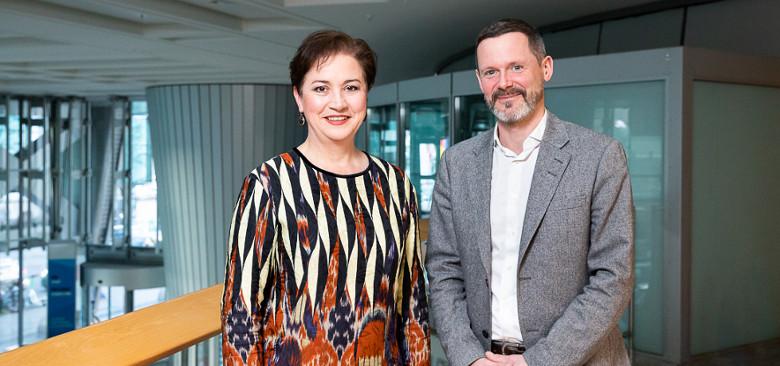The VBKI management introduces itself
Ute Weiland and Dr. Thomas Letz in conversation.
Two new faces at the head of the VBKI's main office: Dr. Thomas Letz, a proven expert in Berlin politics, joined the team around our Managing Director Ute Weiland at the beginning of February, who also took up her position at the VBKI at the beginning of the year. In an interview with our Head of Communications Sebastian Thomas, they talk about their plans - and introduce themselves in more detail.
Dear Ute, dear Thomas, you have been associated with the VBKI for years - can you still remember how you came to the VBKI?
Ute Weiland:I was like probably many VBKI members - on recommendation. I was told that to be properly networked in Berlin, you absolutely have to be there. I followed this tip. Two years after I joined the association, I was invited to co-chair the Mobility Committee committee. My impression was confirmed there: The VBKI is above all its committed members! It is always impressive to see how everyone gets involved and wants to improve the city. For example, in the context of our charitable projects or by working on the content of our committees. Without the impetus from our committees, we would certainly not be in a position to accompany and help shape Berlin's future agenda in a constructive and critical manner. When it comes to administrative modernization in particular, we have been in close contact with political decision-makers for some time and many of our suggestions have been incorporated into the city's agenda. And basically, we all want the same thing: to achieve something good for our city.
Thomas, what was it like for you?
Dr. Thomas Letz: My first impressions of the VBKI go back to the time when I worked at the IHK Berlin. As you know, both institutions are located in the same building, so the distances are short. I have vivid memories of the so-called "elephant rounds", for example, in which IHK Managing Director Jan Eder and long-time VBKI Managing Director Udo Marin put the political leaders through their paces in a very entertaining way. During my time as Head of Planning in the Red City Hall, I was able to observe the high regard in which the association is held by politicians. So I can confirm first-hand: The VBKI's word carries weight. Not least for this reason, it was a matter of course for me to join the VBKI when I became self-employed. As co-chair of the Economic Policy Committee committee, I was able to experience the VBKI as an institution where you can effectively place ideas and get things moving. At the VBKI, commitment always finds fertile ground. I greatly appreciate this openness.
Ute, the VBKI is very diverse - is the commitment to Berlin the unifying element?
UW: Grown, committed bourgeoisie - many non-Berliners might think of Hamburg, Bremen or Düsseldorf first. Wrongly, in my opinion. Of course, Berlin has its own history, which is peppered with many caesuras. Nevertheless, I note that the VBKI in particular offers a recognized platform and home to the committed citizens of this city. Of course, for historical reasons, the focus has long been on the west of the city. However, I am very pleased that the association has now also established itself in the east of the city and in the Brandenburg region. It basically goes without saying: As a business organization, we don't think of the location within the narrow confines of Berlin; our field of action is the metropolitan region. In this respect, yes, our commitment to the metropolitan region is certainly something that moves and unites all of us in the VBKI.
And on numerous levels.
UW: Sure, and that's what I appreciate about the VBKI. As Thomas already mentioned, we give anyone who wants to the opportunity to effectively contribute their ideas to the current debate - in cooperation with the leaders from business and politics. In addition to this role as a source of political impetus, we live out our commitment to the city and its people with numerous charitable projects. We help where help is needed - in education, sport, culture and integration. This commitment is certainly a key unique selling point of the VBKI that is highly recognized throughout the city ...
... and also documents that the city and its people really are at the center of our activities.
TL: I agree with that. We are not a lobbying association, but our thoughts and actions are geared towards the interests of the city as a whole. It's always about added value for the whole city. This orientation is widely accepted and recognized, even in the political echelons. As a result, our work gains credibility. From an external perspective, we also benefit from the fact that we are organized across all sectors. Here, the restaurateur meets the industrialist, the founder meets the artist. This diversity and heterogeneity creates a completely different inspirational dynamic than a purely single-topic association. That is also what sets us apart.
Ute, in the course of your professional career to date, the focus has been on international and nationally relevant topics. To what extent do you plan to bring this experience to the VBKI?
UW: For me, Berlin is the most international city in Germany. And I have the impression that this characteristic is not yet reflected to the necessary and possible extent in the VBKI. For example, I would like to see us open up our membership to the many people who have come here from abroad to realize their entrepreneurial plans and dreams. In terms of content, I can also imagine broadening our view beyond Germany's borders. As an example, I would like to mention a topic that has occupied me intensively in the past: urban development. Whether in Berlin, London, Paris or Barcelona, we all face similar issues in the world's major cities. So why not learn from each other? In any case, I have resolved to intensify the exchange in this direction - and I am convinced that the VBKI is an ideal platform for this. What is important to me, and this applies to all our activities, is that we achieve tangible results together - ideally in terms of concrete improvements for the city.
TL: This also means that we have to constantly reassure ourselves of our role and our goals. Our members are the asset that we at the VBKI can really use to our advantage. Our task is to develop this potential for the benefit of the city. Specifically, I envisage developing an even greater impact in dialog with politicians in order to bring the many good and constructive ideas to bear. This certainly includes a certain understanding of how our community works. It is also important to recognize the contexts in which people operate - in politics or administration, for example. I'm not a fan of simple political bashing. It's more important to me to understand why processes falter - and then to see how the VBKI can help. To give you an example: We have been very closely involved in the modernization of the administration over the past few months and, in my opinion, have contributed some very good ideas. We will continue to do so - in cooperation with the political players involved.
Big events cast their shadows ahead. Let's start with the Special Olympics World Games 2023, which will take place in Berlin in June and July. The VBKI will be there!
UW: Yes, sport and the promotion of sport have long been close to the VBKI's heart. With the Special Olympics World Games we have the world as our guest in Berlin in June and July. The VBKI supports the event wholeheartedly. On the one hand, because it will help to further increase acceptance of inclusion issues. And secondly, it will raise Berlin's profile as a sports city and wonderful host - worldwide.
Our Ball der Wirtschaft on May 20 is still ahead of the Special Olympics World Games. What are you particularly looking forward to?
UW: For me it's actually the first time Ball der Wirtschaft- and then also in the role of the new managing director! Very exciting! I very much hope that the atmosphere on the evening of the ball will also reflect the spirit of optimism that we are feeling after more than two years of forced break due to the pandemic. In any case, I am very much looking forward to getting together and celebrating with 2,500 members and friends of the VBKI. And of course I'm particularly looking forward to dancing with Thomas. By all accounts, he is a gifted dancer ...
TL: I see I have to lay my cards on the table: I actually learned to dance with Mangelsdorff in Reinickendorf. That will certainly mean something to the true Berliners.
So you're already well prepared and counting down the hours until May 20?
TL: In any case, I'm really looking forward to what is sure to be a great evening - and especially to dancing with you, dear Ute. Will it be a Viennese waltz or a rumba? Let's see!
Thank you very much!
About the people:
Ute Weiland has been VBKI Managing Director since the beginning of the year. She previously managed the business of the "Germany - Land of Ideas" initiative for six years. In 2022, she headed the East German Economic Forum. From 2003 to 2016, she worked for the Alfred Herrhausen Gesellschaft, Deutsche Bank's international forum, where she became Deputy Managing Director in 2008. Her responsibilities there included strategic program development, international networks and communications. Ute Weiland has been a member of the Executive Board of the "Urban Age" conference series at the London School of Economics since 2004 and a member of the Governing Board of LSE Cities since 2010. From 2004 to 2016, she coordinated the international Urban Age conference series of Deutsche Bank and LSE. Ute Weiland studied at the "Franz Liszt" Academy of Music in Weimar. After reunification, she headed the office of the State Secretary in the Saxon Ministry of Culture. In 1997, she co-founded the Erich Pommer Institute in Potsdam. Before taking up her full-time position, she was involved in the VBKI as co-chair of the Mobility Committee.
Dr. Thomas Letz joined the VBKI as Deputy Managing Director at the beginning of February. Thomas Letz earned his master's degree at the Sorbonne in Paris and completed his doctorate in medieval history at the TU Berlin with a scholarship from the German National Academic Foundation. After starting his career as an assistant to the board of Fleurop AG, he worked at the Berlin Chamber of Industry and Commerce as a consultant for economic policy and then as head of policy and planning at the Rotes Rathaus. In 2018, he founded his own strategy consultancy with numerous projects at the interface of politics, administration and business. He also holds a number of honorary positions, including as spokesperson for the Smart City Berlin network. Before moving to the office, he co-chaired the Economic Policy Committee at the VBKI.






